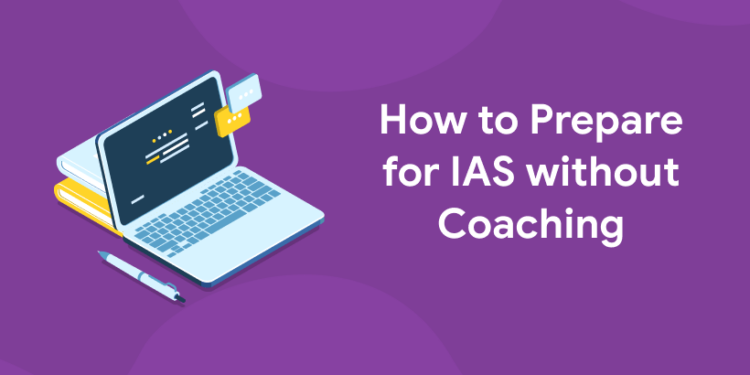Table of Contents
How to prepare for IAS without coaching? This is a question asked by many UPSC aspirants. UPSC Civil Services Exam is one of the most popular competitive exams in the country. It is organized by Union Public Service Commission. The level of difficulty of the exam is as high as the popularity of the exam. The difficulty level is not just because of the complexity of topics but also due to the vastness of the syllabus. Preparing for IAS is not very easy. Many people go to famous coaching institutes for preparing for UPSC. But this is not the only way. This article will give you a few pointers on preparing for UPSC without joining coaching.
How to Prepare for IAS without Coaching?
It may sound impossible. But yes, it is possible to clear UPSC Exams without coaching. Many applicants passed this exam without attending any prestigious coaching institutes. But this will require you to put in more work on your part. As we all know IAS Exam is very competitive and requires a lot of hard work, consistency and perseverance. The lack of guidance and pieces of advice that a mentor can offer will make your UPSC preparation more challenging if you choose not to attend coaching. The applicant decides to make it according to their learning requirements. Some pieces of advice on “How to Prepare for IAS without Coaching” are listed below.
Eligibility
The first step for preparing for the UPSC exam is making sure that you fit all the eligibility criteria. The applicant must be a graduate. They should also have ages between the prescribed ranges.
Choosing the Optional
Selecting an apt optional will give the candidate a greater advantage over the people who choose a popular but not suitable optional for themselves. The potential of different subjects is varied and can create a huge score variation. Selecting an optional that is unsuitable for your learning style and interest will be one of the main reasons for failure. This is important as for UPSC scaling of optional subjects is not possible, only moderation is in the picture. Some important things that have to be considered before choosing an optional are given below.
- Check whether it is easy to gain marks i.e. to score in a specific subject. According to this criterion, psychology, anthropology and public administration were most popular among the aspirants.
- Make sure that the optional chosen is best matched with talents and skills possessed by an aspirant.
- The interest of the candidate also must be taken into account when deciding. For example, there is no point if a person with zero interest in literature selects a language as an optional.
- A subject having common areas with general studies, essays and interviews will drastically reduce the amount of learning you have to do. You have to analyze how much this subject is reducing the amount of learning and how much time it saves.
- The length of the syllabus should be taken into account along with the time available for preparation.
- It will be easier to choose a subject from your educational background
- Ensure the availability of a sufficient amount of study materials in the market.
A Bright IAS Career Awaits for you! Get Free Demo Class!
Analyzing the Syllabus
The next step is analyzing the syllabus of Prelims, Mains and Optional papers. This is the preliminary step that will help decide all other things such as the selection of study materials and the making of a study plan. If done without a detailed understanding of the syllabus all the above steps will be useless.
Analyzing and Practicing Previous Year Question Papers
Analyzing the previous year’s question will give you a fair idea about where you stand when it comes to knowledge level and how far you have to go. It will also create awareness about the level of difficulty, pattern and topic weightage in the exam. This will help you in regulating your learning and make necessary adjustments. This will also help you concentrate more on relevant areas and skip obsolete topics. Solving the previous year’s paper will also help you gain similar benefits. It will improve your writing speed too.
How to Prepare for IAS without Coaching by Choosing Appropriate Study Materials
Applicants get a short time to prepare for the exam. But the market is flooded with a massive amount of books and study materials. This makes everything confusing for the student. There are too many books and too little time. So it is essential to be selective when buying study materials. Make sure that they cover the topic under the syllabus and do not contain outdated information.
Preparing the Best Study Plan
After analyzing the syllabus, and previous year’s question papers and choosing appropriate books, start formulating an efficient study plan to cover all the topics within the limited time you have. You can cover the entire syllabus effectively if you make daily, weekly and monthly goals. It is essential to make goals that are realistic and achievable. Also, decide the frequency of revision to promote concept retention. Once everything is set, you should put on a voluntary effort to stick to the plan. Even slight deviations from the plan can derail the entire strategy.
Creating a Strong Foundation
A student needs to have a solid foundation in all subjects. If the foundation is not strong then the student’s entire understanding of concepts in that subject will be shaky and full of confusion. Learn basics by reading NCERT textbooks.
Selective Study
As discussed above the UPSC exam require a candidate to study too much in too little time. The only way to cover the vast syllabus is by using selective study. Read previous year’s question papers and make a blueprint of the marks weightage of each topic. We will see that some subjects have more marks/ questions allotted than others while some are entirely neglected. When you understand the pattern then arrange your plans according to it. Allot more time for important areas. Skipping the less important areas entirely is not advisable. But you should not waste too much of your time on them.
Newspaper Reading
Read the newspapers like The Hindu and The Economic Times. At the very least try to read the editorial and important news coverage that are relevant for the exam. Also, pay attention to daily current affairs analysis and monthly current affairs analysis. Supplement this knowledge by reading magazines like Yojna and Kurukshethra. Don’t forget to note down important points that can improve your answers.
Time Management
Time management is very crucial for UPSC candidates. Follow the steps given below for best time management.
- Set realistic goals while planning. Biting off a huge amount and finally becoming unable to chew is a sign of bad planning. This will create a sense of de-motivation in you. Also, make sure to think of ways to make the plans flexible in the case of an emergency.
- Setting small targets can be done by dividing the extensive syllabus of UPSC exams into small portions. This will help you to not be overwhelmed by the sheer vastness of the syllabus.
- Avoid distractions. Keep technology that works as entertainment away from the study area. Avoid listening to music while reading.
Attempting Mock Tests
Attempting mock tests will help you to improve your results in many ways. They are:
- Gives you an idea about your knowledge level and makes you aware of your strengths and weaknesses. This will help you focus more on the required areas.
- Improves your writing speed and accuracy.
- It gives you a feeling of writing an actual exam which helps us to understand how to manage time in the exam hall.
- This will help you formulate test-taking strategies that work best for you.
Revision
Revision is extremely important in the case of any competitive exam. Revision improves your memory and knowledge retention. It is generally advised to devote weekends for revision. Keep in mind that the moment you stop revising a topic you will start forgetting its content.
This article has tried to answer the question “How to prepare for IAS without coaching?” as best as possible. The key is starting the preparation as early as possible.
Problems Faced during IAS Exam Preparation without Coaching
- Vast syllabus
- Lack of proper resources and guidance
- Short period available for preparation
- Lack of help with difficult areas
- No one to evaluate descriptive-type answer questions
A Bright IAS Career Awaits for you! Get Free Demo Class!
How to Prepare for IAS without Coaching FAQs
- When should be revision done?
Revision should be done every weekend.
- What is the first step of UPSC Preparation?
Understanding the syllabus is the first step.











